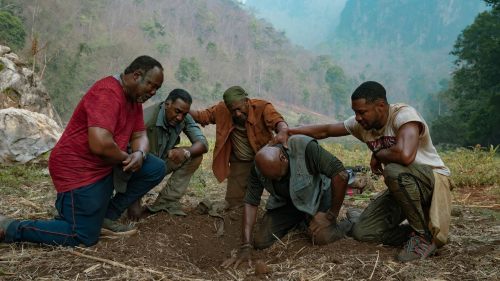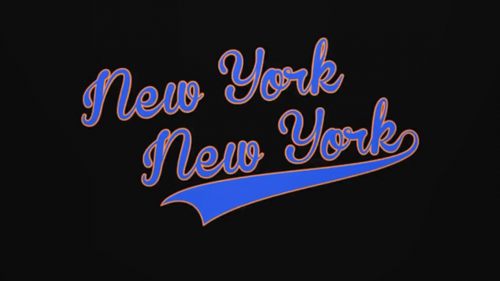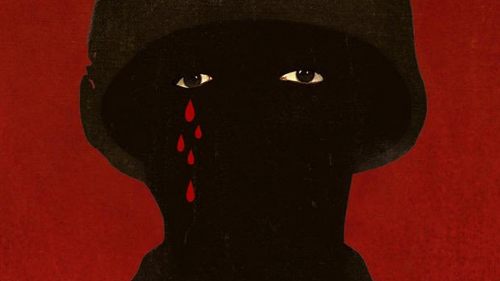BLACKkKLANSMAN Review: Re-Birth Of A Nation
BlacKkKlansman is bookended by images of American Civil War. In fact, the first shot we see isn't even composed by director Spike Lee. Rather, it’s re-used imagery from Gone With the Wind, as Victor Fleming's camera continues to pull back over the battlefield of Atlanta, until a giant, flapping Confederate flag takes up the majority of the frame. To reveal the latter would be doing virgin viewers a disservice, but the same symbol of Southern pride is glimpsed several times over in Klansman’s climactic non-fiction footage of atrocity, as Lee is not only clearly illustrating how little has changed since the 1800s, but also how things may have gotten worse in the near 80 years that transpired between the two pieces of filmmaking.
Pop filmmaking – and how it can be subverted – is a major theme of Lee's latest: a comedy based on "some fo' real fo' real shit", where Colorado Springs detective Ron Stallworth (John David Washington) goes undercover inside the Ku Klux Klan, that’s using a rather recognizable cinematic formula (the buddy cop comedy) to essentially indict a sitting president of out and out bigotry. While Gone With the Wind is initially cited, D.W. Griffith's Birth of a Nation makes several recurring appearances as Stallworth – aided by his Jewish "white half", Philip 'Flip' Zimmerman (Adam Driver) – climbs the ranks of the white power organization and even befriends its Grand Wizard (excuse me, "National Director"), David Duke (played with smarmy hilarity by Topher Grace).
In typical Lee fashion, though BlacKkKlansman may be the Brooklyn auteur’s most accessible movie since ‘06's Inside Man – another piece of straight up pulp that smuggled subversive themes regarding America's financial and policing institutions – it's also his most radical since possibly Do the Right Thing. In essence, Lee is offering up the antithesis to Gone With the Wind and Birth of a Nation; two pictures that romanticized slavery, with Griffith's silent landmark being credited by the Klan as a motivator for the hate group's inception. Had BlacKkKlansman been titled Re-Birth of a Nation, it would probably be just as apt, as it's practically a call to arms against those who align themselves with the intolerant, a dog whistle for anti-fascist strikes against the cold, prejudiced heart that currently powers America.
Yet while all that sounds incredibly heavy – and Lee’s movie certainly hits an emotional apex that’s downright paralyzing in its power – BlacKkKlansman is often side-splittingly funny. From the moment we're subjected to a piece of Klan propaganda in the process of being filmed (hosted by Alec Baldwin, profanely flubbing lines like Bill O'Reilly on Inside Edition), Lee and co-screenwriters David Rabinowitz, Charlie Wachtel, and Kevin Wilmott are stuffing almost every scene full of ridiculous verbal and sight gags. Tonal shifts have forever been a hallmark of Lee's filmography, but he may employ them to their greatest effect with BlacKkKlansman. By the time the movie stops to consider the gravity of its "truth is stranger than fiction" recounting of this '70s sting, we’ve been disarmed just enough to let him bring the hammer down. From the "white voice" Washington employs when speaking with his blue uniformed compatriots, to the dumfounding levels of idiocy his redneck vectors display (I, Tonya's Paul Walter Hauser again exhibiting a knack for utter buffoonery), Lee is fully embracing the opportunities for satire his seemingly insane set up presents.
As good as Washington is as the afro'd leader of this covert operation – having to internalize a great deal of abuse he receives from his fellow officers and then toss it back with a series of stoic stares – Driver is the not-so-secret MVP of BlacKkKlansman. His Flip Zimmerman is a man who approaches the current scenario like he would any other investigation: busting the KKK means no more or less to him than ensaring a drug or prostitution ring. When Stallworth confronts Flip about him acting like he doesn't "have skin in the game", the senior detective literally states that he's never considered himself an outsider or target of hate due to his own Judaism. But as the movie trucks along, it becomes clear that having to slip under the hood of these venomous monsters is making him confront his own heritage, and what it means to others. "Before, I'd never thought about it, now I can't stop thinking about," Flip says about his faith, before trailing off with, "these rituals..." In an instant, Driver lets us recognize a man grappling with his own soul, placing another stick of emotional dynamite under each seat in the auditorium.
Aesthetically, BlacKkKlansman showcases Lee's usual "family affair" method of assembling a crew, unifying the movie’s visuals and sonics with the rest of his outstanding body of work. Pass Over cinematographer Chayse Irvin – who also shot Beyonce's stunning musical Lemonade – mixes together a hodgepodge of digital, three-perf 35mm and blown out 16mm to create an almost disorienting tableau of cinematic styles, slyly acknowledging the past along with Spike's racist reference points via its patchwork of modern and antiquated photographic mediums. Regular Spike composer Terence Blanchard's tunes are jazzy and smooth, sounding like a lost soundtrack to a '70s cop serial we've never seen. All the while, Spike employs his usual thumbprints – harsh overhead lighting, skewed close ups, and yes even a "dolly ride" at the end – to ensure there's no mistaking BlacKkKlansman for another artist’s work.
In fact, BlacKkKlansman may be the most punch drunk in love with cinema piece of filmmaking we've gotten from Lee in a long while; his images practically jump off the screen at times. A black power movement is intercut with montages of enraptured African-American faces, staring up at speaker Kwame Ture (Corey Hawkins) as he spits hot fire into the crowd. A sequence where Stallworth finds himself falling for student union activist Patrice (Laura Harrier) is joyous in its ability to capture the rhythm of '70s soul through a collection of dancers on the floor. Even the comedic bits absolutely pop and sing, as you can tell Lee’s invigorated by the material, and totally invested in letting the audience explore just how audacious the tale he's telling truly is.
None of this is to say that there aren't flaws contained in Lee's latest. A "race the clock" climax is a touch, well, anticlimactic, and a few moments near the end feel like they were included without any real set up (a separate sting where Stallworth ensnares a bigoted, antagonistic colleague kind of comes out of nowhere). Nevertheless, to focus on the slight missteps the movie makes seems like a "forest for the trees" approach to viewing BlacKkKlansman. This is fiery, inciteful mainstream filmmaking, looking to rile an audience up who's tired of the status quo and being ostensibly powerless to stop the current administration's campaign of hatred. Just as Stallworth is baptized in the flames of his first operation, we've been subjected to a new torrent of bigotry, and must be reborn enraged and ready to take down those who've operated with impunity for far to long. One of the last images we see before Lee wraps up BlacKkKlansman with a montage that relates its period pulp to the current era is the glorious reflection of a burning cross in a Klan member's eye, reminding us that these racists shouldn't be allowed to marvel at their cowardly acts any longer. Brothers and sisters, it's time for a revolution.
BlacKkKlansman is in theaters now.



